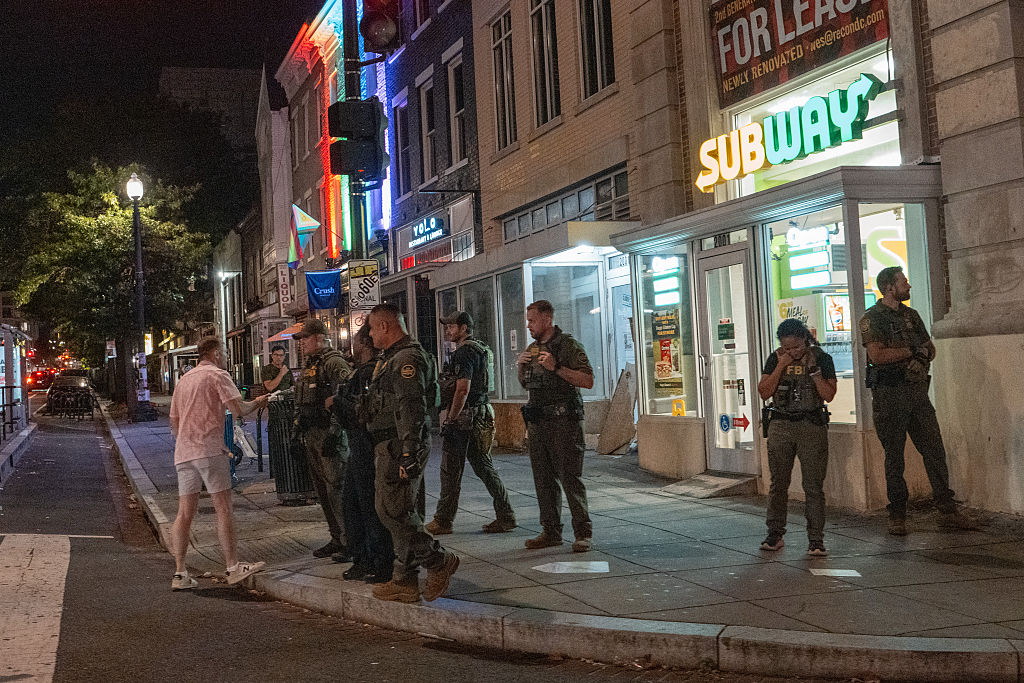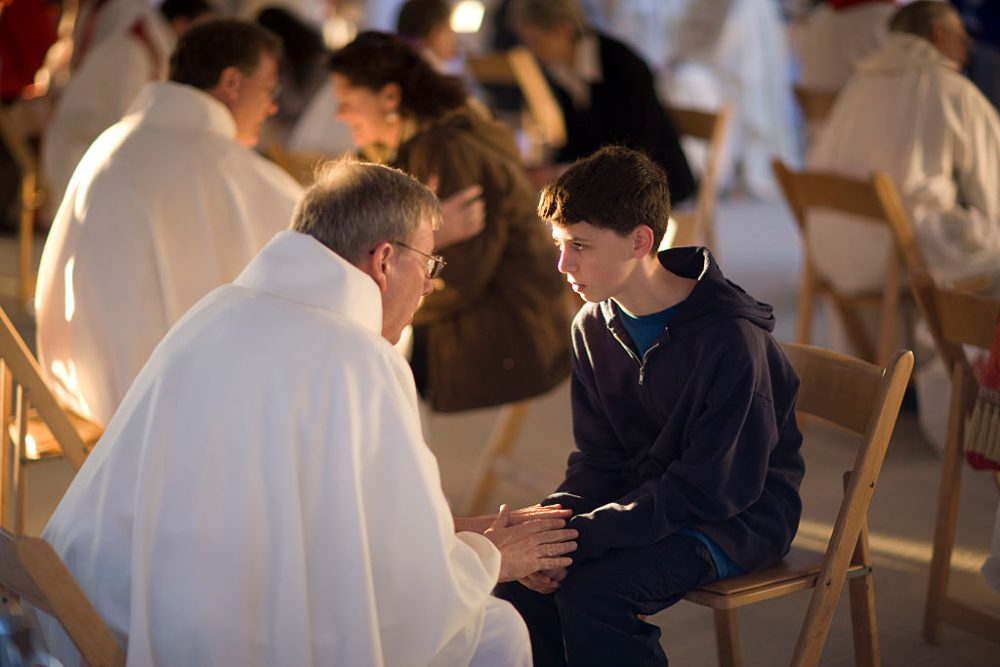Last weekend, eight people were killed and over 300 were injured at rapper Travis Scott’s Astroworld music festival in Houston, as the crowd surged toward the stage. If a nine-year-old boy who fell from his father’s shoulders fails to emerge from his medically induced coma, the death toll could increase to nine.
Scott took the stage at 9 p.m. By 9:38, authorities had deemed it a “mass casualty” situation. Instead of stopping the performance and attempting to defuse the situation, as musicians often do, Scott continued performing for another 37 minutes. An ambulance entered the throng. The crowd chanted “STOP THE SHOW!” Two concertgoers climbed on stage screaming “People are dead!” at a camera crew. Despite all this, Scott claims he wasn’t aware of how bad things had gotten.
He has a history of inciting such incidents. Security guards who have worked Scott’s concerts before report that he frequently whips crowds into a frenzy and encourages concertgoers to rush the stage. He was charged with reckless conduct after performances in 2015 and 2017, and could be facing further charges for the deaths and injuries at Astroworld. Injured and traumatized attendees have already filed dozens of lawsuits.
If this is starting to sound like one of those rants in which some conservative square pledges to boycott an artist he’s never listened to in the first place, let me assure you that isn’t the case. I’m not Geraldo Rivera telling off Kendrick Lamar or Bill O’Reilly feuding with Nas. I’m actually something of a fan of Travis Scott’s music. His 2016 Birds In The Trap Sing McKnight is (was?) among my favorite albums.
Birds falls firmly within the “trap” sub-genre. Conventional rappers pride themselves on lyricism. Trap artists are all about vibe. Instead of the razor-edge, high-wire vocal style of Eminem or Black Thought that foregrounds the lyrics through precise timing and breath control, Scott sounds like he’s coming off a bender as he insouciantly tosses off his couplets. This is fitting, since most of the lyrics are about going on benders of various kinds.
What draws me to Scott’s album is its thoroughgoing nihilism. Sex, drugs and booze have long been staples of the rap genre, but where a Mac Miller would make the lifestyle sound like lighthearted fun, Scott seems almost bored with it. Instead of boasting about his wealth and possessions, he laments “I got shit to lose / that shit make me nervous.”
Scott’s numbness to everything his money can buy isn’t just posturing. Elsewhere on the album, he raps about himself and his crew passing around women like joints. He makes plans to “coordinate the Xans with the lean,” timing his ingestion of two separate and highly addictive drugs so that the highs complement each other without making him too sick. Such behavior goes beyond a wild night out. It suggests a tolerance so elevated that no amount of stimulation is sufficient to break his apathy. But he’ll keep at it, without joy and without hope.
It’s in this despairing persistence that the album’s beauty lies, and it’s how songs suffused with apathy can be such “ragers.” Scott is tragically transgressive like Milton’s Satan, beating his wings in vain like Dante’s Satan.
Satanic imagery is common in Scott’s subgenre. XXXTENTACION, who died of a gunshot wound in 2018, openly embraced it: “Fear will be plentiful, death will be bountiful / I will spare none of you peasants / Fuck your religion … I am a demon / The son of a serpent.” Lil Uzi Vert’s name is both a loose homophone for “Lucifer” and a reference to firing a gun into heaven. Lil Nas X, who burst on the scene with the corny, playful “Old Town Road,” shocked listeners when he released limited edition shoes covered in satanic symbols to accompany a music video in which he gives the devil a lap dance.
At the Astroworld festival, Scott embraced this aesthetic as well. A massive inflatable totem of his head mirrored the depiction of the hellmouth in Bosch’s Christ in Limbo and other medieval art. His shirt showed demonic figures walking through some sort of portal. The stage took the shape of an inverted cross.
I don’t think the people who died at Astroworld were intentionally murdered as part of some kind of soul-harvesting ritual, as has been absurdly suggested on TikTok. At the same time, journalists who laugh off concerns about occultism as QAnon nonsense (QAnonsense?) aren’t seeing the whole picture. Hellish imagery, hellish motives, and hellish energy yielded a hellish result. You don’t have to believe the world is secretly governed by devil-worshipping billionaire cannibals to see that Scott is employing this symbolism intentionally. You don’t have to be religious to understand that symbols have power.
Even outside of music, satanism is having a moment. In an excellent essay for UnHerd, Mary Harrington concludes that satanism is fast becoming America’s state religion. Not satanism in the sense of literal belief in a malevolent bodiless power, but satanism as glorification of self, war against all constraints, frenzied pursuit of every desire. This is what Scott’s music is all about. That it’s honest about the futility of its project only heightens the appeal. But ultimately it serves to sink us in sub-humanity, turning us into stampeding animals, or worse.
This kind of dark, often violent, religiously inflected debauchery is the rule, not the exception, throughout human history. The ancient Greeks longed to be possessed by the spirit of Bacchus. They used the term sparagmos to describe a mob tearing a victim (human or animal) apart with their bare hands under the influence of Dionysian ecstasy. Now, with “twenty[-one] centuries of stony sleep” coming to an end and post-Christian culture coming into its own, we’re seeing the re-emergence of that spirit. Things are going to get a whole lot weirder.
Yes, medieval Christians also cut loose during their carnivals and Feasts of Fools, but they could afford to turn the world upside-down because they knew what it looked like right-side-up. Chaos was the fringe of cosmic order. The Lord of Misrule reigned for a day, not for eternity.
Scott makes the kind of music that will kick a raucous drinking party (or even my own wedding reception) into overdrive. For a significant portion of my life I viewed “raging” as a religious experience, a striving after transcendence that brought me closer to God. There was some truth in that, but only within limits. Remove those, and you’re likely to end up in a much darker place.
Grayson Quay is a Young Voices associate contributor based in Arlington, Virginia. His writing has been published in the Pittsburgh Post-Gazette, Modern Age and the American Conservative.

























